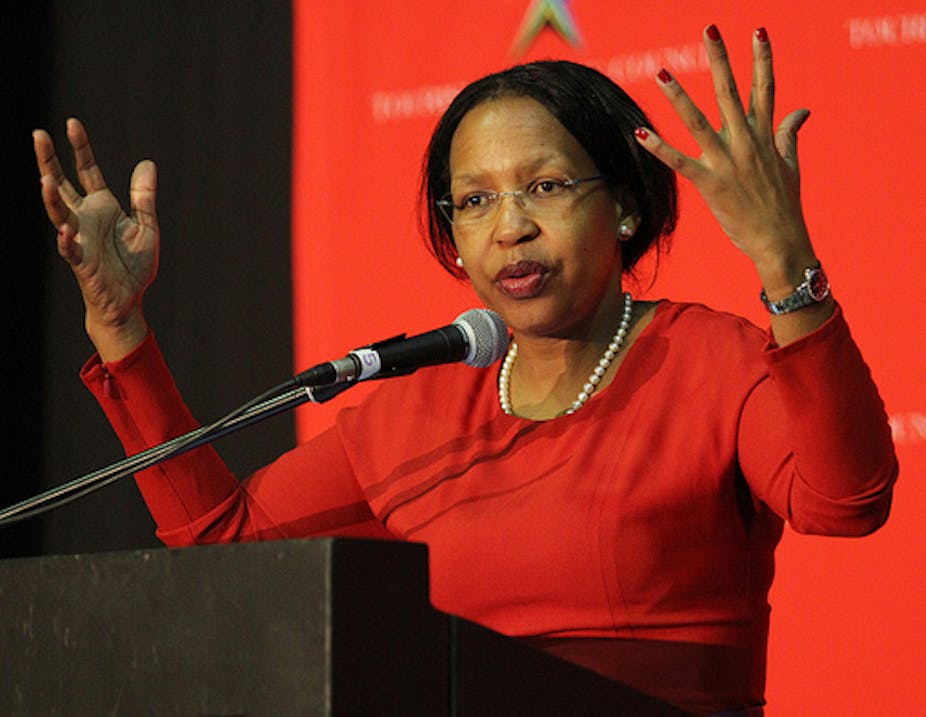The recent resignation of Qedani Mahlangu, the local government minister for health in Gauteng, South Africa’s wealthiest province, over the deaths of 94 mental health patients is a rare occurrence in the country.
The country’s top political executives don’t resign as a way of assuming political responsibility for problems in their portfolios. They very seldom account publicly for their responsibilities, or own up when problems arise. Instead, the usual trend is for senior officials who report to them to take the rap. Bureaucrats end up paying the price instead of their political bosses.
Equally rare are resignations of senior people associated with government. The exceptions can be counted on one hand. They include the resignation of Brian Molefe as CEO of the state power utility Eskom. He quit following the release of a damning report into allegations of state capture which showed he had close links to the discredited Gupta family. South Africa’s High Commissioner in Australia, Sibusiso Ndebele, did the same in October 2016. He was accused of taking a R10 million (US$750 000) bribe in his previous position as transport minister.
But none of these resignations came about as a result of individuals taking executive accountability or political responsibility. The resignations cited above were caused by public pressure: in one case because of a public investigation, in the other because he faced criminal charges.
Similarly, Mahlangu quit hours before a damning report was released that laid bare neglect and callous disregard for vulnerable patients under her watch.
In other words none took public accountability for their actions.
How others fare
Assuming executive political responsibility for mistakes, disasters or political failures is regarded as an entrenched democratic principle linked to public accountability in many countries.
Recent examples include resignations of the British and Italian prime ministers. Both David Cameron and Matteo Renzi stepped down after losing national referenda.
Historical examples of political leaders resigning include US President Richard Nixon for his role in the 1974 Watergate scandal and Japan’s prime minister Naoto Kan after the Fukushima nuclear tragedy.
But there are also many examples where senior politicians didn’t do the honourable thing. Bill Clinton didn’t resign as US president over his scandalous affair with Monica Lewinsky, an intern. More recently, South Korea’s scandal hit President Park Geun-hye has refused to leave office despite massive demonstrations against her.
Dearth of accountability
Unacceptable executive conduct by political heads can assume different forms. These include unconstitutional, illegal and unethical conduct and administrative misconduct.
In South Africa these activities are regulated by a host of legislative and other directives. These include the Executive Members’ Ethics Act, the Code of Ethical Conduct and Disclosure of Members’ Interests for Assembly and Permanent Council and the Ministerial Handbook In addition, the constitution has provisions for impeachment.
Ministers, therefore, cannot escape the binding nature of their political responsibility by claiming that it depends mainly on moral judgement, which can differ from person to person.
But in South Africa they do escape this responsibility despite all the checks and balances in place. The general trend is that national and provincial government ministers don’t take personal political responsibility. Instead they act as bystanders when a scandal erupts or an embarrassing event occurs while their senior officials take the blame.
Examples abound. The most noteworthy have been the arms deal scandal, the illegal use of Waterkloof airforce base by the controversial Gupta family and the Marikana massacre.

And the lack of accountability extends to the highest echelons of power – like the Nkandla scandal over President Jacob Zuma’s use of public money to build his private homestead. In 2016 the Constitutional Court found that Zuma had acted inconsistent with the constitution and also illegally. Yet he remains in office.
Given this scenario, what are we to make of Mahlangu’s resignation over the deaths of the 94 mental health patients on her watch? Does her departure constitute a break with the past? Is it symptomatic of changes in the governing African National Congress (ANC)?
Pragmatism, not accountability
We should not over interpret the significance of the development. Mahlangu resigned shortly before the Health Ombudsman’s damning report became public. This means her resignation was also due to public pressure and not because she’d accepted that she’d failed in her job.
But the fact that she resigned is nevertheless significant. And here context matters.
The ANC’s decline in support across the province of Gauteng – and its defeat in its two major cities Johannesburg and Tshwane – in the August 2016 election came as an existential shock to the party.
And there’s now a real chance that the ANC provincial leadership will lose its majority in 2019. Thus the party needs to present itself as being radically different in Gauteng when it comes to ethics, accountability and leadership qualities.
Mahlangu’s resignation could be a demonstration of this. But we’ll only know if this is the case if similar resignations follow.
A complicating element in the Mahlangu case is the implication of the principle of collective executive responsibility. Does it mean that only the MEC and her department must take blame for the deaths of 94 patients? Or must the entire Provincial Executive Council, including the Premier, take the blame?
Parliamentary government is normally associated with collective responsibility. In other words, the leader, in this case the premier, must demand accountability from the ministers.
It’s fair to say that the ANC is a long way from accepting this much more radical approach to governing accountability.

